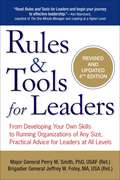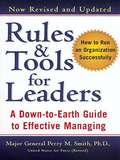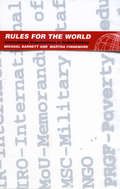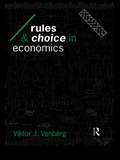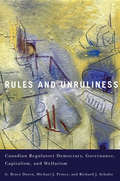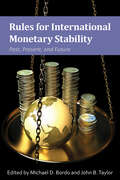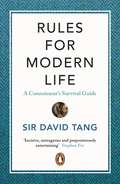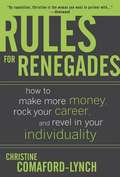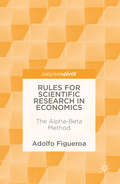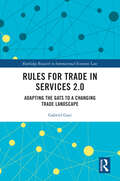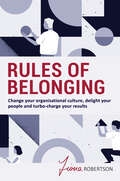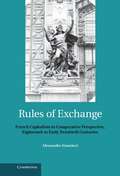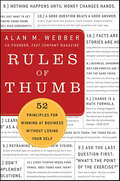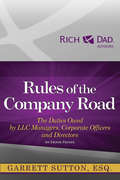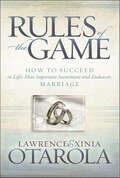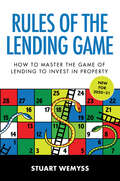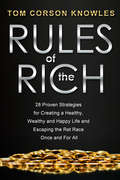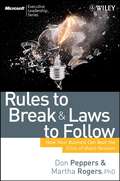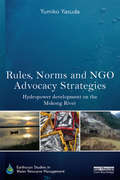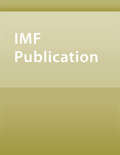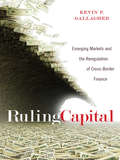- Table View
- List View
Rules & Tools for Leaders
by Perry M. Smith General Jeffrey W. FoleyRules and Tools for Leaders offers insightful and useful advice that avoids the flavor-of-the-month management theories that are long on speculation and short on practical application. This is a fully revised, updated, and reorganized edition of a classic management handbook. It never loses sight of the big picture of how any company should operate. It provides useful and time-tested advice that can be implemented immediately to the benefit of the entire organization. From defining the qualities of outstanding leaders to putting good leadership skills into practice, from managing yourself and others to handling the difficult tests that leadership brings, this book includes valuable checklists and reviews. In addition, it highlights some of the best leadership programs and presents a host of compelling and instructive anecdotes that illustrate the ideas throughout.
Rules & Tools for Leaders
by Perry M. SmithRules & Tools for Leaders has guided hundreds of thousands of leaders, showing them the ways to create and maintain growth and profitability. From hiring, firing and promoting to responding to major corporate crises, from day-to-day encounters to long-range strategic planning, Perry covers virtually every aspect of leadership and provides the means to get the job done—and done well. Along with a thorough understanding of group dynamics, business models, and ethical practices, Rules & Tools for Leaders also features invaluable checklists and guidelines—providing everyday tools to put the tried-and-true rules into effect. .
Rules For The World
by Michael Barnett Martha FinnemoreRules for the World provides an innovative perspective on the behavior of international organizations and their effects on global politics. Arguing against the conventional wisdom that these bodies are little more than instruments of states, Michael Barnett and Martha Finnemore begin with the fundamental insight that international organizations are bureaucracies that have authority to make rules and so exercise power. At the same time, Barnett and Finnemore maintain, such bureaucracies can become obsessed with their own rules, producing unresponsive, inefficient, and self-defeating outcomes. Authority thus gives international organizations autonomy and allows them to evolve and expand in ways unintended by their creators. Barnett and Finnemore reinterpret three areas of activity that have prompted extensive policy debate: the use of expertise by the IMF to expand its intrusion into national economies; the redefinition of the category "refugees" and decision to repatriate by the United Nations High Commissioner for Refugees; and the UN Secretariat's failure to recommend an intervention during the first weeks of the Rwandan genocide. By providing theoretical foundations for treating these organizations as autonomous actors in their own right, Rules for the World contributes greatly to our understanding of global politics and global governance.
Rules and Choice in Economics: Essays in Constitutional Political Economy (Economics As Social Theory Ser.)
by Viktor J VanbergFirst published in 1994. Routledge is an imprint of Taylor & Francis, an informa company.
Rules and Unruliness: Canadian Regulatory Democracy, Governance, Capitalism, and Welfarism
by G. Bruce Doern Michael J. Prince Richard J. SchultzA critical examination of Canadian regulatory governance and politics over the past fifty years, Rules and Unruliness builds on the theory and practice of rule-making to show why government "unruliness" - the inability to form rules and implement structures for compliance - is endemic and increasing. Analyzing regulatory politics and governance in Canada from the beginning of Pierre Trudeau's era to Stephen Harper's government, the authors present a compelling argument that current regulation of the economy, business, and markets are no longer adequate to protect Canadians. They examine rules embedded in public spending programs and rules regarding political parties and parliamentary government. They also look at regulatory capitalism to elucidate how Canada and most other advanced economies can be characterized by co-governance and co-regulation between governments, corporations, and business interest groups. Bringing together literature on public policy, regulation, and democracy, Rules and Unruliness is the first major study to show how and why increasing unruliness affects not only the regulation of economic affairs, but also the social welfare state, law and order, parliamentary democracy, and the changing face of global capitalism.
Rules for International Monetary Stability: Past, Present, and Future
by Michael D. Bordo and John B. Taylor, editorsSince the end of the Great Recession in 2009 the central banks of the advanced countries have taken unprecedented actions to reflate and stimulate their economies. There have been significant differences in the timing and pace of these actions. These independent monetary policy actions have had significant spillover effects on the economies and monetary policy strategies of other advanced countries. In addition the monetary policy actions and interventions of the advanced countries have had a significant impact on the emerging market economies leading to the charge of 'currency wars.' The perceived negative consequences of spillovers from the actions of national central banks has led to calls for international monetary policy coordination. The arguments for coordination based on game theory are the same today as back in the 1980s, which led to accords which required that participant countries follow policies to improve global welfare at the expense of domestic fundamentals. This led to disastrous consequences. An alternative approach to the international spillovers of national monetary policy actions is to view them as deviations from rules based monetary policy. In this view a return to rules based monetary policy and a rolling back of the " global great deviation" by each country's central bank would lead to a beneficial policy outcome without the need for explicit policy coordination. In this book we report the results from a recent conference which brought together academics, market participants, and policy makers to focus on these issues. The consensus of much of the conference was on the need for a classic rules based reform of the international monetary system.
Rules for Modern Life: A Connoisseur's Survival Guide
by Sir David TangDo gentlemen wear shorts? What are the rules regarding interior decor in a high-security prison? Is it ever acceptable to send Valentine's cards to one's pets?The twenty-first century is an age of innumerable social conundrums. Around every corner lies a potential faux pas waiting to happen. But if you've ever struggled for the right response to an unwelcome gift or floundered for conversation at the dinner party from hell, fear not: help is at hand.In Rules for Modern Life, Sir David Tang, resident agony uncle at the Financial Times, delivers a satirical masterclass in navigating the social niceties of modern life. Whether you're unsure of the etiquette of doggy bags or wondering whether a massage room in your second home would be de trop, Sir David has the answer to all your social anxieties - and much more besides.
Rules for Renegades: How to Make More Money, Rock Your Career, and Revel in Your Individuality
by Christine Comaford-LynchWant A Richer Life? Break All The Rules Renegade entrepreneur-and runaway success story-Christine Comaford-Lynch has lived the kind of life most of us can only dream about. From model to monk to multimillionaire, she does what she wants-and gets things done. Now, in ten outrageous life lessons, she'll show you how to make your dreams come true. Your way. Your rules. Rules for Renegades distills what Christine has learned as she succeeded (and failed) in business, built strong relationships (and some disasters), and evolved spiritually and professionally. If you want to become financially independent, she'll show you how to do it. If you want to build your confidence and self-esteem, she'll give you a crash course. If you want a meaningful life full of rich connections, she'll share her secrets. Ultimately, she lets you in on the greatest secret of all-how to build a fulfilling life while rocking your career. She has also filled her book with lots of cool free stuff: links to a sample business plan outline, tutorials on sales and marketing techniques, and tools to help you enhance your own power. You'll learn the surprising truth behind her most offbeat rules. . . Everything's an Illusion, So Pick One That's Empowering. Rock Rejection and Finesse Failure. Learn to Love Networking. Work Your Money Mojo. Rules for Renegades is not just the story of a remarkable entrepreneur. It's an amazing approach to life that breaks the rules-and makes life work for you.
Rules for Scientific Research in Economics
by Adolfo FigueroaThe new research method presented in this book ensures that all economic theories are falsifiable and that irrefutable theories are scientifically sound. Figueroa combines the logically consistent aspects of Popperian and process epistemologies in his alpha-beta method to address the widespread problem of too-general empirical research methods used in economics. He argues that scientific rules can be applied to economics to make sense of society, but that they must address the complexity of reality as well as the simplicity of the abstract on which hard sciences can rely. Furthermore, because the alpha-beta method combines approaches to address the difficulties of scientifically analyzing complex society, it also extends to other social sciences that have historically relied on empirical methods. This groundbreaking Pivot is ideal for students and researchers dedicated to promoting the progress of scientific research in all social sciences.
Rules for Trade in Services 2.0: Adapting the GATS to a Changing Trade Landscape (Routledge Research in International Economic Law)
by Gabriel GariThis book explores the adaptating process of the General Agreement on Trade in Services (GATS) to a constantly changing trade and policy context.The adoption of the General Agreement on Trade in Services (GATS), a multilateral agreement with stand-alone rules and principles for the governance of trade and investment in services, represented a watershedin the history of global trade governance. Over three decades after the drafting of the Agreement, WTO Members struggle to deliver on the GATS’ mandate to achieve progressively higher levels of trade liberalisation in a radically different trade and policy landscape. Against this background, this book examines the contribution of the WTO negotiating, adjudicative, and deliberative functions to adapting the GATS to changing circumstances. The book uncovers an extremely flexible and adaptable agreement whose full potential has yet to be realised due to a complex set of factors weighing more broadly on the use of the WTO functions. The book distils the factors at play that constrain WTO Members’ capacity to adapt the Agreement to changing circumstances and explores potential pathways to overcome them.The book will be of interest to scholars, policy makers, and trade diplomats interested in understanding the factors and processes conditioning the adaptation of a multilateral trade agreement to changing trade and policy circumstances.
Rules of Belonging: Change your organisational culture, delight your people and turbo charge your results
by Fiona RobertsonOrganisational culture is very poorly understood and has been way over-complicated. It's not easy, but it is simple. Once you know what to look for, you can identify the current culture of any group by the current rules of belonging in that group; you can articulate the desired culture as the new rules of belonging that will help speed up the execution of your strategy; and move from the current to desired state in a series of clear, deliberately managed steps.The subject of organisational culture is a hot topic globally with regulators of financial services and other industries increasingly seeking to enforce culture measurement and management and to sanction leaders who do not properly do both - up to and including criminal prosecution.Practically every senior leader is now looking at how to measure and manage culture and is struggling to know how to address it. The somewhat tragic fact is that most of them don't know what it is, let alone how to manage it. They consistently confuse culture with employee engagement (they are not the same thing!) and are running around trying to solve the wrong problem. We are seeing lots of frantic activity, most of which won't achieve anything other than making it look like someone is doing something, but almost none of which will result in actual culture change.Meanwhile leaders at all levels in large and small organisations are stuck with dysfunctional teams and need a way to take action immediately that will actually make a difference. Improving the culture of their team will speed up their ability to implement and radically reduce the time they would otherwise spend on managing conflict and dysfunction. This book will show them how.
Rules of Exchange
by Alessandro StanzianiThe control of competition is designed, at best, to reconcile socioeconomic stability with innovation, and at worst, to keep competitors out of the market. In this respect, the nineteenth century was no more liberal than the eighteenth century. Even during the presumed liberal nineteenth century, legal regulation played a major role in the economy, and the industrial revolution was based on market institutions and organisations formed during the second half of the seventeenth century. If indeed there is a break in the history of capitalism, it should be situated at the turn of the nineteenth and twentieth centuries, with the irruption of mass production, consumption and the welfare state, which introduced new forms of regulation. This book provides a new intellectual, economic and legal history of capitalism from the eighteenth century to the early twentieth century. It analyzes the interaction between economic practices and legal constructions in France and compares the French case with other Western countries during this period, such as the United Kingdom, the United States, Germany and Italy.
Rules of Thumb: 52 Principles for Winning at Business without Losing Your Self
by Alan M. WebberA Fast Company founder and former editorial director of Harvard Business Review provides “guidance and hope in a world gone upside down” (Jim Collins, New York Times–bestselling author of Good to Great).Take your work seriously, Yourself, not so much.Loyalty is a two-way street.Don’t implement solutions. Prevent problems.This dramatic, unpredictable era has wiped out time-honored businesses and long-standing institutions while ushering in unprecedented opportunities for creative individuals and entrepreneurial organizations. The job is no longer figuring out how to win at the game of work and life—it’s figuring out the new rules of the game.Rules of Thumb provides fifty-two rules for individuals in every walk of life who want to make sense out of these confusing, challenging, and compelling times. If you're looking for practical advice on how to win at work without losing your self, if you want to change your life to meet the challenge of change, or if you want to learn from some of the world’s most interesting and creative people, let entrepreneur, Santa Fe mayor, and acclaimed business author Alan M. Webber take you on a remarkable journey toward greater personal understanding and, ultimately, greater personal success.“Fifty-two practical lessons gleaned from more than forty years of working with extraordinary leaders in a variety of endeavors . . . valuable, thought-provoking ideas.” —Booklist
Rules of the Company Road
by Garrett SuttonWhen driving a car you need to know the rules of the road. You've learned, and now know as second nature, that you can get home safely by following these rules. The same applies when running a business or investment. You most likely know you'll be better protected when using a corporation, limited liability company (LLC) or limited partnership (LP), all of which offer asset protection. But by using each entity (a corporation, LLC or LP legally chartered by a U.S. state) there are certain rules you must follow to stay protected and operate in the clear.A large body of these rules are called the corporate formalities. These are the obligations to keep your entity active with the state, to hold meetings once a year and to file tax returns, among other requirements. Failure to follow the formalities can lead to a piercing of the corporate veil and a loss of limited liability protection. By piercing the corporate veil a creditor can reach through the entity and get at an owner's personal assets. Suffice it to say, you do not want your veil pierced.This ebook primer discusses these formalities in detail to help you maintain your corporate veil.
Rules of the Game: How to Succeed in Life's Most Important Investment and Endeavor, Marriage
by Lawrence Otarola"Rules of the Game is truly a blue print for devising a game plan to succeed in life's most precious investment - Your marriage. When your home life with your wife is not in proper order, then your business life can be in constant disarray. Lawrence and Xinia Otarola unveil an authentic road-map for creating a game-winning strategy in your marriage that will bleed into other important areas of life. This book will deposit nuggets of virtues that'll turn war room situations opportunities to display resolve and showcase your life as trophies of grace. Tracie and I believe in the originality of the ideas and concepts and strongly recommend their approach for helping leaders WIN in both LIFE and their MARRIAGE." - Manny Ohonme, Co-Founder, President & CEO- Tracie Ohonme, Co-Founder & Executive Vice President. Don't settle for a good marriage, build a better one!According to Brian Tracy, “at least 90 percent of new businesses succeed if their founders are experienced entrepreneurs—the ones who have figured out the rules and make decisions based on those rules.” Using an entrepreneurial, business lens to explore timeless marriage wisdom, equip yourself- even those who have experienced the pain, failure, and loss of a separation- with the tools to get up and rebuild a strong and vibrant marriage partnership. By learning the Rules of the Game, the risks involved and how to “play fair,” you will understand what it takes to be successful in this wonderful encounter between two people who love each other and dare to risk everything in order to undertake life’s most important investment and endeavor: marriage. The results just might surprise you!
Rules of the Lending Game: How to master the game of lending to invest in property
by Stuart WemyssInvesting in property is the largest single financial transaction anyone will make. Property buyers usually concentrate their research on online search engines, looking at glossy photos of beautifully staged homes. Instead, they would be better off working out how much they will need to borrow, how they should structure their loan and who would be the best lender. Author and personal finance expert, Stuart Wemyss, admits that finding the right loan is a bit like a game of snakes and ladders. You run up the ladder when you think you've found the lowest interest rate, only to slide down the snake when you realise the fees are high and conditions are stringent. "Interest is the single largest lifetime expense for investors" says Stuart. "The amount of borrowings investors carry affects their net worth and their cash flow and can make or break their retirement goals. Getting their borrowing right and structuring their investments correctly can save a considerable amount of money - often thousands of dollars per year."To make sure you get your borrowing right, Stuart explains the Rules of the Lending Game in this fascinating book. It contains invaluable information on: Choosing the right loan products Calculating how much to borrow and how to reduce the overall cost Structuring loans to manage cash flow and create wealth Making the most of your equity.
Rules of the Rich: 28 Proven Strategies for Creating a Healthy, Wealthy and Happy Life and Escaping the Rat Race Once and For All
by Tom Corson-KnowlesFinancial success is possible if you&’re willing to learn the Rules of the Rich—learn how to kick fear in the butt and achieve your goal now. You don&’t have to wait to get rich until you&’re too old to enjoy spending your money. It takes only three to five years using the wealth-creating strategies in this book to create a small fortune and early retirement if that&’s what you want. Certainly, some industries require heavy capital investments upfront, like oil and gas exploration or industrial manufacturing—but almost any other business can be started with $1,000 or less. Great entrepreneurs understand that you can pre-sell almost any product and collect the money upfront. Then, once you have the cash you can build the product and deliver it to your customers. This is how massive companies can be started with little or no cash—just look at the histories of Fortune 500 companies like Apple, Microsoft, or Whole Foods. Thanks to our new networked economy, technology, and opportunities, anyone from anywhere in the world can start a business for less than $1,000—and turn it into a successful wealth-producing company in just a few short years. What&’s holding them back from starting one now? It&’s fear—the kind of fear that makes you keep your mouth closed when you wish you could speak up and ask for what you really want. It&’s the fear that stops you from moving forward in life—and achieving the wealth and success you deserve. And there&’s only one thing that will conquer your fear: commitment to your own success. Discover why the old rules of financial security and retirement are broken—and learn the new rules that will save you from the financial ruin so many Americans face. In this life-changing book, entrepreneur Tom Corson-Knowles shares his secrets to lasting business and financial success passed down by hundreds of entrepreneurs and millionaire mentors.
Rules to Break and Laws to Follow
by Don Peppers Martha RogersPraise for Rules to Break & Laws to Follow: How Your Business Can Beat the Crisis of Short-Termism"A fascinating, highly readable synthesis of business principles, technology, sociology and common sense, Rules to Break and Laws to Follow persuasively shows the connection between customer trust and business profits, and then explains how to make it happen. As a bonus, you'll learn how to make your company more innovative, how to ensure your employees actually enjoy what they're doing, and how to deal with the kinds of service and quality breakdowns that occasionally plague any company, even a well-managed one. This book should be on your required reading list."--Stephen M. R. Covey, bestselling author of The Speed of Trust: The One Thing That Changes Everything"Over the years, Peppers and Rogers have given me valuable advice about navigating the changing business landscape. This book is a must-read for managers who want to empower their employees and customers to?make change their ally."--Jim McCann, founder and CEO of 1-800-FLOWERS.COM"Highly readable and entertaining. Make sure everybody in your firm reads this book by last Friday."--Dror Pockard, CEO of eglue"In a time when most companies are built to flip, Peppers and Rogers have planted a stake in the ground to help you survive past the next round of financing or consumer fad. Knowing what rules to break is arguably even more important than what laws to follow, and this book imparts knowledge for both."--Guy Kawasaki, cofounder of Truemors and author of The Art of the Start"Peppers and Rogers have created the unthinkable: an enjoyable wake-up call! Their book serves up one compelling and provocative idea after another, and the authors enjoy debunking some of our most deeply ingrained business beliefs. Read this book and your customers will thank you."--Dan Heath, coauthor of Made to Stick: Why Some Ideas Survive and Others Die
Rules, Contracts and Law Enforcement in the Ottoman Empire: The Case of Tax-Farming Contracts (Palgrave Studies in Institutions, Economics and Law)
by Fuat Oğuz Bora AltayThis book examines the role of institutions and law on the economic performance of the Ottoman Empire between 1500 and 1800. By focussing on the pre-industrial period, the transition to industrialisation and the mechanisms behind it can be explored. Particular attention is given to the allocation of financial resources towards more productive and efficient economic activities and the role this played in economic divergence among societies. A comparative analysis with European societies highlights the importance of non-economic institutions during the pre-industrial period. This book aims to provide new analytical perspectives and ways of thinking about how the Ottoman Empire lost its powerful economic and political structures. It is relevant to students and researchers interested in economic history, law and economics, and the political economy.
Rules, Norms and NGO Advocacy Strategies: Hydropower Development on the Mekong River (Earthscan Studies in Water Resource Management)
by Yumiko YasudaThere is much controversy over the development of new dams for hydropower, where concerns for environmental protection and the livelihoods of local people may conflict with the goals of economic development. This book analyses the opportunities and barriers that NGOs and civil society actors face when conducting advocacy campaigns against such developments. Through a comparison of two NGO coalitions in Cambodia and Vietnam advocating against the Xayaburi hydropower dam on the Mekong River, the book explores the intricate interactions of formal and informal rules and norms and how they influence advocacy strategies. A framework for analysis is proposed which serves as a tool for analysis by civil society actors. The author generates fresh insights into the way in which opportunities and barriers are created for NGOs to influence state-centric decision-making processes. The book also discusses Mekong riparian states’ negotiation process over the Xayaburi hydropower dam in detail, providing an analysis of the Mekong River’s governance under the 1995 Mekong Agreement. The book concludes by suggesting ways to improve the engagement of civil society actors in the governance of transboundary rivers and development projects.
Rules-Based Fiscal Policy in Emerging Markets
by George KopitsInspired by the experience of some advanced economies, a number of emerging market economies have recently adopted rules limiting the budget deficit, expenditure level, or indebtedness of the public sector, while others consider them for eventual adoption. This volume brings together policy analysts to discuss the rationale, suitability, and usefulness of fiscal policy rules in emerging market economies. Grouped under three main parts (political economy and macroeconomic setting; design issues at the national level; design issues at the subnational level), the chapters have a practical orientation, based on conceptual grounding.
Rules-Based Fiscal Policy in France, Germany, Italy, and Spain
by Enrica Detragiache Steven Symansky Gian Maria Milesi-Ferretti Teresa Dabàn Gabriel Di BellaIn recent decades, most industrial countries have seen a sharp rise in the size of government and a large accumulation of public debt. An increasing number of countries have adopted formal fiscal rules to deal with high public debt levels, such as balanced-budget rules or multiyear frameworks that limit discretionary fiscal policy. This paper studies the design of fiscal rules and frameworks, focusing on the experiences in France, Germany, Italy, and Spain.
Ruling Capital: Emerging Markets and the Reregulation of Cross-Border Finance
by Kevin P. GallagherIn Ruling Capital, Kevin P. Gallagher demonstrates how several emerging market and developing countries (EMDs) managed to reregulate cross-border financial flows in the wake of the global financial crisis, despite the political and economic difficulty of doing so at the national level. Gallagher also shows that some EMDs, particularly the BRICS coalition, were able to maintain or expand their sovereignty to regulate cross-border finance under global economic governance institutions. Gallagher combines econometric analysis with in-depth interviews with officials and interest groups in select emerging markets and policymakers at the International Monetary Fund, the World Trade Organization, and the G-20 to explain key characteristics of the global economy. Gallagher develops a theory of countervailing monetary power that shows how emerging markets can counter domestic and international opposition to the regulation of cross-border finance. Although many countries were able to exert countervailing monetary power in the wake of the crisis, such power was not sufficient to stem the magnitude of unstable financial flows that continue to plague the world economy. Drawing on this theory, Gallagher outlines the significant opportunities and obstacles to regulating cross-border finance in the twenty-first century.
Ruling Europe
by Martin Heipertz Amy VerdunThe Stability and Growth Pact (SGP) is central to Economic and Monetary Union (EMU) in Europe. Initiated by Germany in 1995 and adopted in 1997, it regulates the fiscal policies of European Union Member States. Following numerous violations of its deficit reference value, the Pact's Excessive Deficit Procedure was suspended in 2003. The decision to suspend was brought before the European Court of Justice in 2004 and the SGP then underwent painstaking reform in 2005. After a period of economic prosperity and falling budgetary deficits, the global economic crisis is putting the system under renewed stress. Ruling Europe presents the first comprehensive analysis of the political history of the SGP as the cornerstone of EMU. It examines the SGP through different theoretical lenses, offering a fascinating study of European integration and institutional design. One cannot understand the euro without first understanding the SGP.
